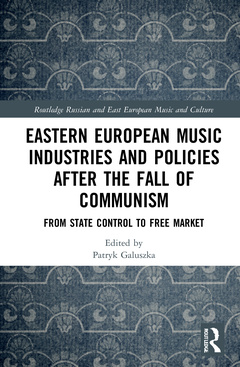Eastern European Music Industries and Policies after the Fall of Communism From State Control to Free Market Slavonic and East European Music Studies Series
Coordonnateur : Galuszka Patryk

During the last thirty years Eastern Europe has been a place of radical political, economic, and social transformation, and these changes have affected the cultural industries of its countries. This volume consists of twelve chapters by leading international researchers. Stories are documented of various organisations that once dominated the ?communist music industries? ? such as state-owned record companies, music festivals, and collecting societies. The strategies employed by artists and industries to join international music markets after the fall of communism are explained and evaluated. Political and economic transformations that coincided with the advent of digitalisation and the Internet intensified the changes. All these issues posed challenges both to record labels and artists who, after adjusting to the rules of the free-market economy, were faced with the falling record sales of records caused by the advent of new communication technologies. This book examines how these processes have all affected the music scene, industries, and markets in various Eastern European countries.
Part I: Introduction
1. Contextualising research on the Eastern European music industries
Patryk Galuszka
2. Creating a market economy in Eastern Europe: Economic reform as the central theme of the transition
Tomasz Legiedz
Part II: Russia
3. Piracy as an institutionalised social practice in Soviet and post-Soviet Russia
Marco Biasioli
4. ‘We have no music industry!’ Exploring the context of post-Soviet music making through the lens of contemporary Swedo-Russian collaborations
Ingrid M Tolstad
Part III: Central Europe
5. Socialist riches to capitalist rags: The disintegration of the GDR music industry during German reunification
Sven Kube
6. Collective management of copyright during communism and transition – A case study of the Society of Authors ZAiKS
Anna Pluszyńska
7. The National Festival of Polish Song in Opole: The transformation of legal, economic, and political circumstances over fifty years of the Polish music industry
Katarzyna Korzeniewska
8. Pohoda: the importance of Slovakia’s greatest festival
Peter Barrer
9. Managing the Eastern European position in the digital era: music industry showcase events and popular music export in Hungary
Emília Barna
Part IV: Southeast Europe
10. The Romanian music scene: The social economy of pop music in the post-socialist period
Elena Trifan
11. Come visit (our past) again: How municipalities encourage retro rock culture on the Bulgarian music scene
Gergana Rayzhekova
12. The Yugoslav and post Yugoslav alternative rock canon presented in the music press
Julijana Papazova
Patryk Galuszka is an associate professor in the Faculty of Economics and Sociology at the University of Lodz, Poland.
Date de parution : 01-2023
15.6x23.4 cm
Date de parution : 04-2021
15.6x23.4 cm
Thèmes d’Eastern European Music Industries and Policies after the... :
Mots-clés :
Music Industry; Music Export; Eastern Europe; Federal Republic Of Germany; Eastern European music; National Libraries; communist music industries; Major Record Labels; music festivals; East Germany; collecting societies; Alternative Music Scene; fall of communism; Music Market; communism; Tv Station; economy; culture; Television Committee; free market; Shock Therapy; busic business; BNR; music and culture; Evolutionary Institutionalist Perspective; Patryk Galuszka; Yugoslav Rock; Routledge Russian and Eastern European Music and Culture; Polish Song; Digitalisation; Alternative Rock Bands; Alternative Rock Music; International music markets; Showcase Festivals; Free-market economy; CMOs; Eastern European countries; West Germany; Turbo Folk; Music Magazines; Polish People's Republic; Popular Music Education


